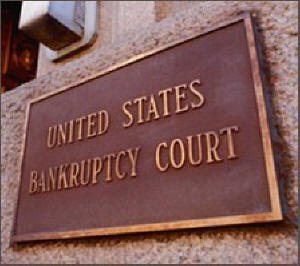Our Pledge To You
Collaboration
Excellent legal representation means working closely with each client: 1) listening carefully; 2) fully researching; and 3) discussing each alternative. The client makes strategic decisions while lawyers pursue the legal tactics necessary to achieve the client's goals.
|
|
 Bankruptcy May Be
An Alternative For You
Today, in these difficult economic times, more and more hard working Americans as well as owners of small and medium sized businesses have found themselves in impossible financial circumstances. Higher gas prices and soaring inflation are decreasing disposable income while some are facing the loss of a job, extraordinary medical expenses or other unexpected costs.
Far too many people ow must deal with unscrupulous collection agencies and some have been "ripped off" by so-called "debt reduction services" scams.
Businesses are caught in a double bind. With revenues declining and costs increasing, their options are fast dwindling and many owners now find that those personal guarantees on business debts are a threat to all their family assets too!
Of course, the "fat cat" bankers and auto company executives get government "bailouts". But, for the rest of us - those whose families or businesses have hit a financial "wall", there are no alternatives! Or are there?
A Fresh Start
Most of us recoil at even the thought of bankruptcy. However, in some cases, it is a truly reasonable alternative that can restore a family or a business to financial health. That's why, back in 1934, the U.S. Supreme Court outlined the purpose of our bankruptcy laws. The Court stated:
"...[Bankruptcy] gives to the honest but unfortunate debtor…a new opportunity in life and a clear field for future effort, unhampered by the pressure and discouragement of preexisting debt".
Getting a "fresh start" is what bankruptcy is all about. The attorneys of Legal Associates of California can help lift the burden of overwhelming debt off of your shoulders so that once again you will be able to afford the day to day necessities, begin rebuilding your net worth and get on with your life!

If you represent a business, we can assist you in a liquidation or, if you desire, present a plan to the court that may allow you continue to operate and reorganize. Through this process we can help you improve your operation and retain management control. Ultimately, you may be able to return the enterprise to a competitive and financially sound business.
Preparing the many complex documents and making the legal judgments to maximize retention of assets is the goal in any bankruptcy case. Legal Associates of California will take you step by step through the process and ensure that you or your business is protected to the maximum allowed by the law.
Our attorneys will thoroughly review your family or business needs and provide all the legal services and guidance necessary to successfully navigate the bankruptcy process.
Legal Associates of California can assist our clients proceed in any type of case under the United States Bankruptcy code. If you need legal services to help cope with overwhelming debt, contact us at 818-267-8003 or Click Here to set up a free consultation.
| Types of Bankruptcy
Below is a brief description of the four types of bankruptcy cases utilized by most families and businesses and how they are used to reduce debt or save businesses from collapse. Each type of bankruptcy process is commonly named after the bankruptcy code provision where it appears in the federal law.
Chapter 7 - Liquidation

This bankruptcy provision contemplates an orderly, court-supervised procedure by which a trustee takes over the assets of the debtor's estate, reduces them to cash, and makes distributions to creditors. But, debtor's have a right to retain certain property which is exempted by the statutes. Often, but not always there will be no actual liquidation of the debtor's assets because much of the debtor's property is exempt and untouchable by collection agencies or creditors. A debtor with unsecured debts such as credit cards or medical bills will have to pay only if there are assets not protected by the law and the creditor files a proof of claim with the bankruptcy court.
In most chapter 7 cases, individual debtors can receive a discharge that removes any personal liability for certain debts. Debtors normally receive the discharge just a few months after a formal legal petition is filed. The Bankruptcy Code requires the application of a "means test" to determine whether individual consumer debtors qualify for relief under chapter 7. The means test process is an inexpensive tool we can provide to help you decide whether bankruptcy is a viable option for you and your family.
Chapter 13 - Adjustment of Debts
Chapter 13 is designed for an individual debtor who has a regular source of income. Chapter 13 is often preferable to chapter 7 because it enables the debtor to keep a valuable asset, such as a house, and because it allows the debtor to propose a "plan" to repay creditors over time – usually three to five years.
At a confirmation hearing, the court either approves or disapproves the debtor's repayment plan, depending on whether it meets the Bankruptcy Code's requirements for confirmation. Chapter 13 is very different from chapter 7 since the chapter 13 debtor usually remains in possession of the property of the estate and makes payments to creditors, through the trustee, based on the debtor's anticipated income. Unlike chapter 7, the debtor does not receive an immediate discharge of debts, but must complete the the payment plan before a discharge is received.
The debtor is protected from lawsuits, garnishments, and other creditor actions while the plan is in effect. The discharge is also somewhat broader (i.e., more debts are eliminated) under chapter 13 than the discharge under chapter 7.
Chapter 11 - Business Reorganization
This type of bankruptcy case is ordinarily used by business enterprises that desire to continue operating while repaying creditors in a manner that is consistent with continuing operations. The chapter 11 debtor usually has the exclusive right to file a plan of reorganization for the first 120 days after it files the case and must provide creditors with a disclosure statement containing information adequate to enable creditors to evaluate the plan. If the court approves the plan of reorganization the debtor can reduce its debts by repaying a portion of its obligations and discharging others. The debtor can also terminate burdensome contracts and leases, recover assets, and rescale its operations in order to return to profitability. Under chapter 11, the debtor normally goes through a period of consolidation and emerges with a reduced debt load and a reorganized business.
Chapter 12 - Adjustment of Debts of
Farmers or Fisherman
Chapter 12 provides debt relief to family farmers and fishermen with regular income. The process under chapter 12 is very similar to that of chapter 13, under which the debtor proposes a plan to repay debts over a period of time – from three to five years. There is also a trustee whose duties are very similar to those of a chapter 13 trustee. The chapter 12 trustee's disbursement of payments to creditors under a confirmed plan parallels the procedure under chapter 13. Chapter 12 allows a family farmer or fisherman to continue to operate the business while the plan is being carried out.
|
|